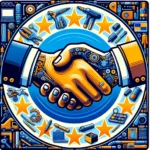Green skills development transcends merely acquiring the capabilities to address the climate crisis; it’s about enabling informed, environmentally-conscious decision-making. With the Middle East’s governments aiming to shift from fossil fuel dependency, green skills are increasingly crucial for economic diversification.
COP28, a pivotal event in 2023, underscored the global urgency for climate action in alignment with the Paris Agreement. It spotlighted the necessity for a collective effort against climate change and previewed a future led by a green-skilled workforce, echoing a global trend towards a sustainable economy.
As we move into 2024, the focus on cultivating talent equipped with green skills is paramount for organizations to accelerate their transition towards sustainability and lead in their domains. Green skills—encompassing the expertise for sustainable development, the values fostering sustainable growth, and the competencies for a sustainable transition—are essential for the green economy.
COP28’s commitment by 118 nations to triple sustainable energy output signals a rising demand for skilled talent across sectors, not just within decarbonization-focused industries. Even fossil fuel sectors require green skills for a smoother transition towards sustainable alternatives.
The Middle East’s proactive stance on green skills, highlighted by PwC’s Middle East Hopes and Fear Survey 2023 and the enthusiastic youth participation at COP28, underscores a growing climate-first mindset. To attract this environmentally aware talent, businesses must prioritize green upskilling, enhancing both their sustainability practices and appeal to prospective employees.
Initiatives like the UAE’s Green Capabilities Global Alliance and mandatory green upskilling programs for government employees, along with Saudi Arabia’s ‘Saudi Green’ initiative, exemplify regional efforts to foster a green-skilled workforce. The message is clear. The development of green skills is essential not only for solving the climate crisis but for making informed, sustainable choices. Businesses and individuals alike must embrace this shift, integrating green skills into their culture and operations. With various learning resources available, from online courses to professional certifications, there’s no excuse not to engage in this crucial evolution towards a greener future.
















